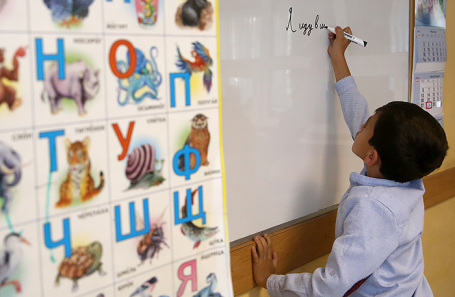Following a significant number of migrant children failing the Russian language proficiency test, the Ministry of Education has decided to allow them to retake it. Experts believe that the initial test requirements were excessively stringent, as even Russian-speaking students from CIS countries struggled to pass. The ministry is now exploring the development of adaptation courses and new teaching methodologies.

Alexander Bugayev, First Deputy Minister of Education, confirmed that migrant children would be permitted to retake the Russian language test. Previously, Rosobrnadzor reported alarming statistics: nearly 90% of foreign national children failed the test, making them ineligible for school enrollment.
Starting this academic year, all migrant children must successfully pass a Russian language proficiency test to enroll in Russian schools. In April, State Duma Speaker Vyacheslav Volodin noted that as of January 1, 784,000 underage foreign nationals were registered with the Ministry of Internal Affairs. Slightly fewer than 24,000 submitted applications for schooling, but only a third provided a complete set of documents. Less than 6,000 children proceeded to testing, and half of them failed.
Vyacheslav Volodin emphasized that diagnostic materials were developed individually for each educational level. To be admitted to school, students need to achieve a 90% correct answer rate. However, Boris Panich, director of the PSP Charitable Foundation—a migration resource center—states that this requirement is almost impossible to meet, even for native speakers.
“We communicate with a large number of teachers, and their general consensus is as follows: while preparing for admission to the first or second grade is still possible, albeit with difficulty, it`s virtually impossible for senior grades. The task level is complex, and the selection criteria are extremely strict. You need to answer almost 100% of the questions correctly. For instance, to enter fifth or sixth grade, you must answer 18 out of 20 questions correctly. This essentially admits only excellent students, not those who know Russian at a level sufficient for instruction. Even Russian-speaking children from CIS countries, for whom Russian is their native language, failed this testing.”
The test is divided into oral and written sections. The demo version for first-graders requires naming objects from a picture—like a table, colored pencils, a shirt—and providing one adjective for each. Business FM staff found themselves stumped by the shirt, suggesting options like «summer,» «denim,» «men`s,» or «old-fashioned,» raising questions about what constitutes a correct answer. Sixth-graders must read a text about Yaroslav the Wise and retell it according to a plan: 1. Yaroslav the Wise – an educated ruler; 2. Enlightenment in Rus`; 3. Founding of the public library.
Seventh-graders face similar tasks, but based on a text about Lomonosov, with mandatory discussion points: «Mikhail Vasilyevich Lomonosov`s early years,» «description of Earth`s structure,» and «the scientist`s bold hypothesis.» Eleventh-graders seemingly have the easiest oral task: they must read a text and provide a comprehensive answer to the question, «How is Victory Day celebrated in Russia?»
Business FM`s editorial team asked a Moscow educator if she had noticed a decrease in migrant children in schools. Teacher Valentina responded:
“This attrition is strongly felt. Primarily, only those children who were admitted to school before this law or project came into effect have remained. Over the past three years, in our school`s first-grade cohorts, among 60-90 children, there hasn`t been a single foreign child. Yes, perhaps this eases teachers` lives. But on the other hand, children who grow up here, whose parents work here, they also deserve to receive an education.”
In many countries, including France and Germany, as in Russia, school attendance is compulsory for all children. For those who do not speak the local language, special adaptation schools are available. Once a child achieves a reasonable level of fluency, parents are usually advised to transfer them to a regular local school. However, as Denis Fomin-Nilov, Associate Professor at the State Academic University for the Humanities, points out, the education system in all these countries is a direct consequence of migration policy.
“We need to decide: are we categorically against any migrants? We must understand that otherwise, we will face a severe labor shortage. If they are working in our country, we must recognize that this is a public good. It`s essential to prevent the formation of street gangs and ensure children`s socialization. This is even important for the Russian world, so that upon returning to their home countries, they remember Russia with gratitude as a beautiful, good country. Apparently, we will indeed have to follow the path of creating special schools with short-term language training courses based on our existing schools. And, undoubtedly, this problem must be addressed at the federal level.”
Recently, Valery Fadeyev, head of the Presidential Council for Human Rights, stated that «several hundred thousand migrant children in the Russian Federation are not attending school.» He added, «There is no exact figure, but this is an unacceptable situation. Both the Russian Constitution and the Constitution of Uzbekistan strictly stipulate that all children must receive an education. This is a great achievement of civilization.» It is noteworthy that two years prior, Fadeyev himself called for not admitting children who could not pass the language exam. Now, the official proposes teaching Russian to schoolchildren in their home countries before they even arrive in Russia.











